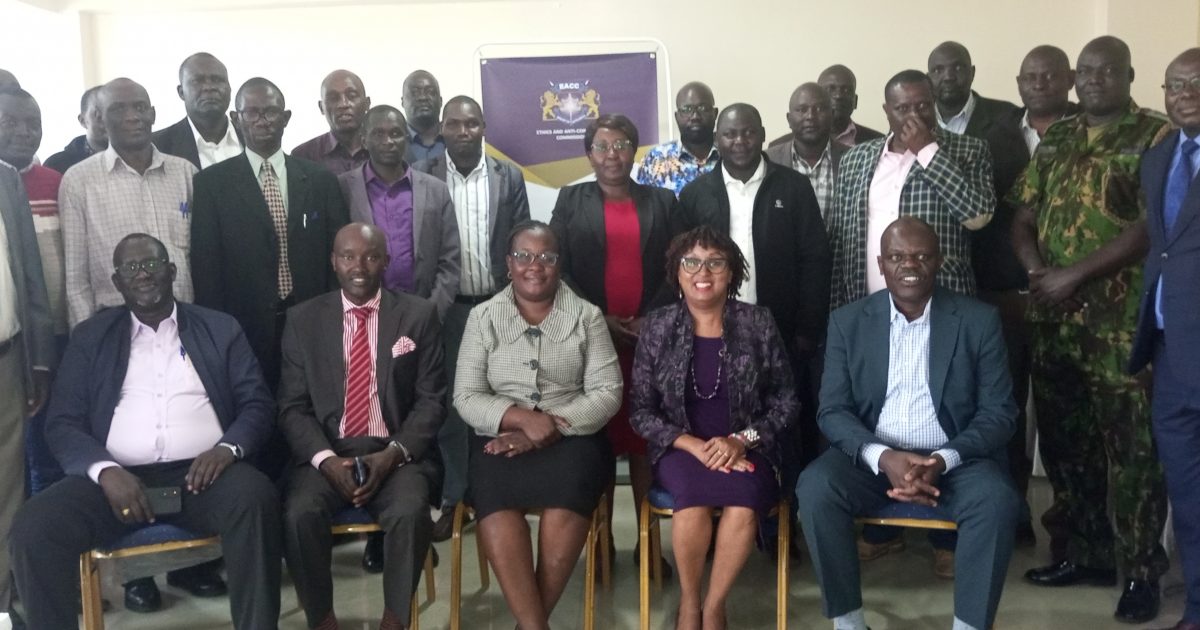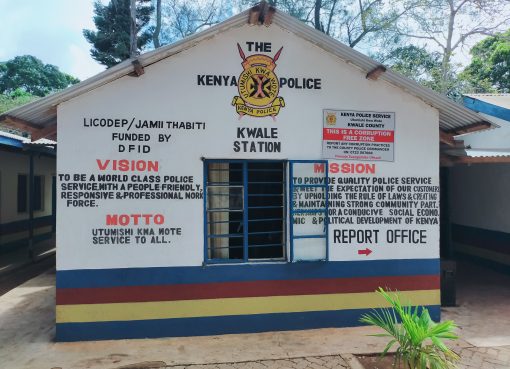The Ethic and Anti-Corruption Commission (EACC) has given vital skills to the employees of West Pokot County comprising of both County and National Governments in a training that will revolutionise work ethics in the region.
The objective of the training was to equip employees with ethics and governance in enhancing their capacity.
While launching the workshop at Kalya hotel conference room in Makutano Town, West Pokot county EACC Director of Education and Public Awareness Dr. Emily Mworia underscored the importance of promoting ethical practices in the workplaces.
Dr. Mworia stated that their purpose for coming to West Pokot was to carry out the responsibilities of the Commission which included preventing and combating corruption through law enforcement, corruption prevention, education, and public awareness in order to promote ethical practices.
She emphasized that the Department of Education at the EACC has a specific mandate, as outlined in section 11 of the EACC Act of 2011, to educate the public and raise awareness on issues related to corruption within the Commission’s jurisdiction.
Dr. Mworia stated that the workshop targeted the Corruption Prevention Committee members, comprising of county executive management and staff from different Departments at both the County and National levels.
“The objective of the workshop is to sensitize them on good governance and how they can incorporate ethics and integrity in their workplaces, as well as involve members of the public in their routine work,” Dr. Mworia mentioned.
Speaking to the press at the launch of the Anti-Corruption capacity-building workshop, the North Rift Regional Manager for EACC Mr. Charles Rasugu emphasized that the Commission has a range of responsibilities, including investigating corruption cases.
He revealed that just like some other counties in the republic, West Pokot County is currently under investigation for two separate corruption cases involving the alleged misuse of bursary funds and irregularities in the construction of Peace Border Schools.
He specifically mentioned a case involving bursaries that were distributed with fraudulent practices, which is currently being investigated by a team of EACC from the Nairobi offices.
“The investigation is at an advanced stage, and the outcome will be announced in due course,” Rasugu stated.
“Allegation of irregularities in the border schools project implementation have been raised, and EACC is actively investigating the matter,” he said.
He said once the investigation is completed, recommendations for adjudication would be made based on the findings.
“We have other cases but I don’t need to enumerate all of them, the outcome is better than talking about the cases we are investigating, we have quite a number of cases which we are investigating,” he noted.
“In order to prevent such cases of corruption from arising, the Commission needs to take a proactive approach to reduce the likelihood of corruption,” he noted.
This is crucial to ensure that resources allocated for public use are effectively utilized and reach the intended beneficiaries.
He observed that conducting investigations was not an easy task, acknowledging that sometimes cases required a significant amount of time for thorough examination.
“This is not because the Commission intentionally prolongs the investigation, but rather due to the complexities involved in uncovering and addressing instances of wrongdoing, where individuals may attempt to conceal the truth,” Rasugu explained.
He noted that it was crucial for the public to understand that the duration of investigations could not be deemed as unnecessarily long noting that it was imperative to allow sufficient time for the investigation to reach its conclusion.
“Some of the investigations are complex in nature. If you are dealing with a case like a bursary case and you find that there are so many people who are involved, collecting the evidence sometimes takes time,” Rasugu said.
He acknowledged that the Commission desires for all ongoing investigations in the county to be concluded promptly.
He emphasized that the Commission has thus far maintained an impressive track record in terms of investigation timelines and handling of cases.
“At the right time, we will be able to have the results of the investigations and it is important that they are done professionally so that the outcome of such kinds of investigations are good for the country,” he said.
Another official at EACC Mr Fredrick Mainda urged the employees to establish a culture of integrity, transparency, and accountability within their organization, where unethical behaviour is not tolerated and where employees felt empowered to report any instances of corruption they encountered.
The Secretary of West Pokot County Mr. Jonathan Siwanyang expressed his gratitude to the officials of the Ethics and Anti-Corruption Commission (EACC) for selecting West Pokot County as the location to raise awareness among the county government staff regarding corruption issues within the county.
He emphasized that the sensitization programmes conducted by the EACC in various marketplaces, institutions, and vocational training colleges across the county is instrumental in preventing corruption.
Siwanyang clarified that although the county was recently ranked as the most corrupt in the country, it was not solely the county government that was responsible for this, but rather the entire county, including both the County and National government.
“Corruption prevention awareness training conducted by the EACC in county will significantly contribute to reducing corruption in the region, ensuring that it no longer remains associated with corruption in the future,” he stated.
He also mentioned that the county government is actively cooperating and maintaining effective communication with the EACC, providing them with the necessary documents for investigating cases related to alleged misappropriation of funds in the county.
Assistant County Commissioner (ACC) Ms. Emily Ogolla, who represented the County Commissioner in the workshop, emphasized the importance of sensitization efforts by EACC in preventing corruption and fostering a culture of integrity and accountability in the workplace.
“Many employees may not fully understand what constitutes corruption or the various forms it can take. Sensitization programs help educate them about the different types of corruption, such as bribery, embezzlement, and nepotism among other vices,” ACC Ogolla said.
“Many employees may lack a complete understanding of what defines corruption or the different manifestations it can take. Awareness campaigns aid in informing them about the diverse forms of corruption, including bribery, embezzlement, and nepotism is important and I thanked EACC for finding time to sensitize the county and national government staff,” he stated.
She emphasized the importance of raising awareness among employees about corruption as essential for cultivating an ethical work environment and deterring corruption-related activities.
By Anthony Melly





